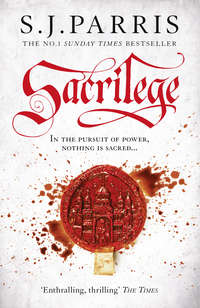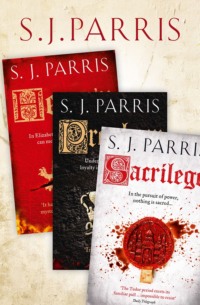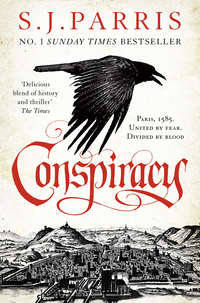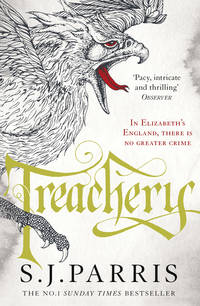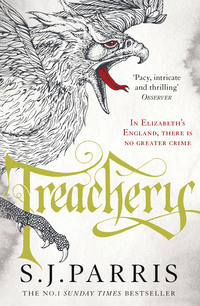
Полная версия
Heresy
‘Doctor Bruno, you have still not answered my question,’ Sophia cut in, leaning across to tap my hand while fixing me with her wide-set, tawny eyes. The hint of a smile played around her full mouth, as if she too knew a great joke and was considering letting us in on it. ‘Who was he?’
I took a deep breath, and returned her expectant gaze as steadily as I could, aware that the whole table had fallen silent, awaiting my answer, and that there was every chance my next words might be considered blasphemy.
‘Hermes Trismegistus, called the Thrice-Great, was an Egyptian high priest of great antiquity,’ I began, turning over a piece of bread in my fingers. ‘He lived after the time of Moses, long before Plato or Christ. Some say he was the Egyptian god Thoth, the divinity of wisdom. In any case, he was a man of unusual insight who achieved, through profound contemplation of the cosmos and experimentation with the properties of the natural world, the wisdom to unlock the secrets written in the book of nature and the heavens. He claimed to have entered and understood the Divine Mind.’ I paused. ‘He claimed he could become equal to God.’
Here there was a collective gasp from around the table; these men knew that this was indeed dangerous ground to tread, and I quickly added,
‘He is called the first philosopher, the first theologian, and he was also a prophet – Lactantius credited him with foretelling the advent of the Christian faith, in the very words of the gospel.’
‘And Augustine said he had his foreknowledge from the Devil,’ Roger Mercer said eagerly, his face reddening further as half-chewed meat fell from his mouth and lodged in his beard, though he appeared not to notice. ‘For does Hermes not write of how the Egyptians animated the idols of their gods in magical rites by calling down the powers of demons?’
‘I have never believed the account of the demons and the statues,’ I said lightly. ‘Men have always created mechanical toys and automatons and claimed to have endowed them with the gift of life, like the brazen head possessed by Roger Bacon that was reported to prophesy. But this is merely conjuring and skilled craftsmanship.’
‘Hermes Trismegistus was no magician, then?’ Sophia said softly, still looking at me. She seemed disappointed.
‘He wrote at length on the hidden properties of plants and stones and the arrangement of the cosmos,’ I replied. ‘There are some who call this alchemy or natural magic, and others who call it scientific enquiry.’
‘When it is done for the purpose of seeking forbidden powers, it is called sorcery,’ the rector put in, sternly.
‘But did he discover any magic that worked?’ she persisted, ignoring her father.
‘How do you mean, worked?’ I asked.
‘I mean, was he able to use this natural magic to influence the world – to change people’s thoughts or deeds, for example, and did he write of how it is done?’ Her eyes were bright and impatient now as she leaned closer.
‘Recipes for spells, you mean?’ I laughed. ‘I’m afraid not. The Hermetic magic, if you want to give it that name, is concerned with teaching the adept how to penetrate the mysteries of the universe through the light of the intellect. He cannot teach you how to make your sweetheart fall in love with you or keep him true – for that you had better consult some village wise-woman.’
There was some amusement at this from those at our end of the table, but the girl coloured violently and I suspected that my joke had accidentally struck the truth, so to cover her embarrassment I continued, hastily:
‘But the German alchemist Henry Cornelius Agrippa does speak of such things, in his treatise on the occult sciences that Doctor Mercer mentioned earlier. He writes that, as well as the celestial images used in magic, we may create our own fitting to our purpose. For example, he says that to procure love, we may create an image of people embracing.’
‘But how –’ Sophia began, just as the rector coughed loudly and the servants entered to clear away the first course.
‘Well, this has been a most illuminating discussion, Doctor Bruno – I knew your conversation and your unusual ideas would enliven our little college society,’ the rector said, patting me on the shoulder with considerable insincerity. ‘But I have devised that we should all change places for each course, so that you may become acquainted with some of the other important officials of the college. Much as I would like to continue with our theme …’ he added.
Now he rose from his seat and fussed around the table, officiously rearranging the seating plan so that I found myself at the opposite end, surrounded by the three men to whom I had not yet spoken. The servants brought in silver dishes steaming with richly scented beef and a stew of vegetables, and in the course of all this activity, the rector’s wife, who had barely spoken, took the opportunity to excuse herself with a headache, apologising profusely to me for being such a poor hostess. She seemed a melancholic and sickly woman, but I recalled what the rector had told me about their son; I had seen such symptoms previously in women who had lost a child, often years after the death, as if the mind itself had taken some wasting sickness from which it could not recover, and I felt profoundly sorry for her. It was hard to credit that such a forlorn creature could have been the author of the lively girl at the other end of the table.
The second half of the meal passed with considerably less interest than the first, now that I had been removed from Sophia’s company. My new dining companions introduced themselves: opposite me sat Master Walter Slythurst, the college bursar, a bony, thin-lipped man of my own age with narrow, suspicious eyes and lank hair that fell in curtains around his face. Beside him was Doctor James Coverdale, a plump man of about forty with a great sweep of dark hair, a close-cropped beard and an air of complacency, who explained that he was the proctor, the official responsible for the students’ discipline. To my right was Master Richard Godwyn, the librarian, who appeared older, perhaps fifty, and whose large, drooping features reminded me of a bloodhound, as though his skin were too big for his face, though his gloomy countenance was transformed when he allowed a brief smile to illuminate it as he shook my hand. All were courteous enough, but I could not help but wish I had been allowed to continue my discussion with Sophia. It was clear that the tenor of our conversation had angered her father; she was now seated next to him, on the same side of the table as me, so that I could not see her without rudely leaning around my neighbour Godwyn and drawing attention to myself.
‘I fear you have had to suffer the sharp end of William Bernard’s tongue up there, Doctor Bruno,’ said James Coverdale, leaning across the table.
‘He seems disappointed with the world as he finds it,’ I observed, checking to see that Bernard had been moved far enough away to be out of earshot.
‘It is often the way with old men,’ Godwyn said, with a sombre nod. ‘He has weathered a great many changes in his seventy winters, it cannot be easy.’
‘If he continues to speak his mind as plainly among the undergraduates as he does among his fellows, he will soon go the way of his friend,’ said Slythurst, in a clipped tone that suggested he would not be displeased at such an outcome. I do not like to judge men on appearance and so little acquaintance, but there was something about the bursar that did not invite respect. He had been staring at me intently from the moment I sat down, and I sensed that the look was not friendly.
‘His friend?’ I asked.
Coverdale sighed.
‘It is a sorry business, Doctor Bruno, and a source of shame to the college – the former sub-rector, Doctor Allen, was deprived of office last year after he was discovered to have …’ he hesitated, looking for a diplomatic expression ‘… perjured himself in swearing the Oath of Supremacy. It seemed he was still a devout communicant of the Roman Church.’
‘Really? How was he discovered?’
‘Denounced by an anonymous source,’ Coverdale said, as if relishing the intrigue. ‘But when his room was searched, he was found in possession of a quantity of banned papist literature. And of course the sub-rector holds the second highest office in the college, and is in charge whenever the rector is absent, so you may imagine the scandal. A number of us here had to testify against him in the Chancellor’s Court.’
‘The university holds its own legal sessions to enforce discipline,’ explained Godwyn the librarian in a lugubrious tone. ‘Though in a matter of such import the Privy Council also took an active interest. The Earl of Leicester – our chancellor, you know – has repeatedly charged the heads of colleges to rid themselves of all suspicion of popery so the rector had to be seen to strike swift and hard against Allen.’
‘Doctor Underhill was formerly the Earl of Leicester’s own chaplain, as he has no doubt boasted to you already,’ added Slythurst. ‘He could not have pardoned Allen and kept his own position.’
‘Yet Allen hoped for a pardon,’ Coverdale interjected. ‘And for better loyalty from his friends. In that he was badly disappointed.’
‘I think the rector did his duty with a heavy heart, James,’ Godwyn said, with a meaningful look at Coverdale. ‘Indeed it grieved all of us to have to bear public witness to his errors.’
‘Roger Mercer gave his testimony quickly enough,’ said Coverdale, glancing with barely concealed anger down the table to where Mercer was laughing merrily with Florio. I saw Slythurst roll his eyes, as if he had heard this grievance many times before. ‘And he was supposed to be Allen’s closest friend. Still, he got his thirty pieces of silver, did he not?’
‘Silver?’ I asked.
‘His testimony was crucial to condemning Allen, and for that he was given Allen’s position when he was deprived,’ Coverdale said bitterly.
‘Perhaps I should clarify for Doctor Bruno that, traditionally, it is the proctor who succeeds as sub-rector, just as the sub-rector goes on to become rector,’ Godwyn explained. ‘This is the way it has always been done – there is a congregation of the Fellows, of course, but the vote is really a formal seal of approval on the established succession.’
‘But since the present rector was placed here by the Earl of Leicester, to do his bidding,’ Coverdale hissed, hunching down in his seat so that he would not be heard, ‘he shows scant regard for tradition and appoints those he finds most pliable. And we all know why Leicester forced through Underhill’s election,’ he added significantly.
‘James,’ said Slythurst, a warning in his voice.
‘I understood it was to enforce propriety in religion,’ I said. ‘Cut out the canker of popery.’
‘Oh, that is the official reason.’ Coverdale waved a dismissive hand. ‘But the college owns substantial manors and parcels of profitable farmland in Oxfordshire, you understand – many of which are now leased at a most advantageous rate to friends of Leicester, are they not, Master Bursar?’
‘You forget yourself, James,’ Slythurst said smoothly. ‘Doctor Bruno here is a friend of the Earl of Leicester.’
‘Indeed, I have never met him,’ I said hastily. ‘I merely travel with his nephew.’
‘In any case,’ Coverdale continued, warming to his theme, ‘the college loses valuable profit and must struggle to make ends meet by admitting legions of these so-called gentlemen commoners – paying students who have neither the inclination nor the talent to be scholars and gad about the town wenching and gambling and bringing the university into disrepute.’
‘This is not an appropriate subject for the supper table,’ said Slythurst, in a voice thick with cold anger, bringing down his palm flat against the board just firmly enough to signal his displeasure. ‘There is nothing improper about those leases, moreover the disbursal of college funds can be of no interest to our guest. A little discretion, if you please, gentlemen.’
The Fellows looked down, embarrassed; an uncomfortable silence loomed.
‘Doctor Coverdale,’ I said, turning to the proctor with a diplomatic smile, ‘you were telling me about the trial of Edmund Allen – please do go on.’
Coverdale exchanged a look with Slythurst that I could not read, then folded his hands together.
‘I was saying only that Mercer’s testimony against Allen carried great weight in the trial, not least because he was Allen’s closest confidant. The rector needed Mercer’s cooperation, and in return he was given Allen’s position.’
‘Which should have been yours,’ I prompted.
Coverdale placed a plump hand on his breast and assumed a face of unconvincing modesty.
‘It is not for my own merits that I say an injustice has been done, Doctor Bruno,’ he said, ‘but for the violation to tradition. This university is founded on tradition, and if individuals feel that they are not obliged to respect it because their personal patronage carries more weight, the fabric of our community will crumble.’
‘Edmund was friend to many of us,’ Godwyn said, with an air of regret. A sombre mood had fallen on our group as once again I heard Sophia, Florio and Mercer erupt into laughter. ‘He was greatly liked by the undergraduates, too – it was a pity that he could not in his heart renounce the errors of his old beliefs.’
‘Exile seems a harsh punishment for owning a few books,’ I ventured, helping myself to more beef and onions.
‘He was lucky to leave England with his guts still inside his belly,’ said Slythurst dispassionately. ‘Less favoured men have had harder punishments for less. You of all people, Doctor Bruno, should know that heterodoxy in religion is a most grave sin, against God and the established order.’ He looked at me pointedly.
‘It was not just the books,’ Godwyn interrupted, in a confidential tone. ‘He was suspected of being a courier for his cousin, William Allen, at the English seminary in Rheims. They took him to London and questioned him under cruel torture, but he never said a word and in the end they sent him abroad. Poor Edmund.’ He shook his head sadly and drained his cup.
‘I met his son today,’ I remarked, tearing another piece of bread.
Coverdale rolled his eyes.
‘Then I pity you,’ he said. ‘No doubt he was begging you to carry pleas to the court for his father’s pardon?’ Without waiting for an answer, he clicked his tongue angrily. ‘That boy should never have been allowed to stay on after his father’s disgrace. Thomas Allen holds dangerous beliefs, mark my words. Though I could not persuade the rector to act on my advice – he is too soft-hearted with that boy.’
I could not help thinking that if the rector’s treatment of Thomas Allen was evidence of soft-heartedness, the boy’s life must be harsh indeed.
‘Once again, it behoves me to say that I do not think our eminent guest has travelled all the way here to listen to us griping about college matters,’ Slythurst interrupted in a voice smooth as ice. He tucked a limp strand of hair behind his ear and turned to me, smiling with his teeth. ‘Tell us, Doctor Bruno, something of your travels in Europe. I understand you have taught at many of the famous academies across the continent. How do you find Oxford by comparison?’
Returning his smile with equal insincerity, for the remainder of that course, and the almond custard and jellied fruits that followed, I told them of my wandering years as the candles burned lower, leaving out what I thought politic and subtly flattering my new companions with what they wanted to hear – namely, that none of the European universities could hold a candle to the great scholarship and wisdom of the men of Oxford.
‘How long do you stay in Oxford, Doctor Bruno?’ asked Coverdale, sitting back in his chair and wiping his lips as the servants cleared away the last plates and cups.
‘I believe the palatine, in whose party I travel, intends to stay a week,’ I said.
‘Then I hope you will attend chapel with us here in the college. The rector is delivering a most erudite series of sermons on John Foxe’s Acts and Monuments, are you familiar with it?’
‘The Book of Martyrs? Naturally,’ I replied, suspecting that this was some sort of test. ‘Many consider it a most inspiring work.’
‘Doctor Bruno is not genuine in his admiration, I fear,’ said Slythurst, glancing from me to his colleagues. ‘I never met a Catholic yet who admired Foxe’s dreadful accounts of what was done to the Protestant martyrs.’
‘Does he not also give many examples of Christian martyrs from the earliest centuries of the faith, when Christians suffered at the hands of pagans and unbelievers, before we began persecuting one another?’ I replied. ‘And are these not martyrs whom all Christians may honour, and whose sufferings may remind us of a time when we lived in unity?’
‘That was not Foxe’s intention,’ Slythurst began, but Coverdale interrupted.
‘Well said, Bruno. Believers on both sides have suffered for Christ, and only He knows who shall stand with Him at the Last Judgement.’
‘That is the first time I have ever heard you advocate tolerance, James,’ Slythurst said, his eyes narrowing even further. Coverdale ignored the provocation.
‘Let us have some more wine here, ho!’ he cried to a serving boy, clapping his hands. I declined another glass, for I wanted to reflect on my notes for the disputation before I went to bed and needed to keep a clear head.
By the time the meal was over, it was fully dark outside the windows and the guests all rose, taking their leave with much handshaking and compliments to the rector on the food, which I understood had been greatly superior to the usual fare of the college hall supper. The Fellows all shook my hand warmly, repeating their welcome to Oxford and wishing me a good night’s rest in anticipation of the great disputation the following day, which they were all, they said, much looking forward to. Richard Godwyn invited me to make use of the library whenever I chose, for which I thanked him, John Florio expressed in perfect Italian his eager hopes that we might spend some time together before I left, and even Doctor Bernard rose unsteadily and clasped my fingers between his two bony hands.
‘Tomorrow night, Sorcerer,’ he hissed, with a toothless grin, ‘you will contradict their pious certainties, and I shall be there in the front row applauding you. Not because I support your heretical notions, but because I admire men who are not afraid. There are too few left in this place.’
Here he glanced pointedly at the rector, who affected not to notice. Only Slythurst did not trouble himself to express a welcome; he merely acknowledged me with a curt nod as he disappeared through the doorway, and only then because I caught him looking at me with those cold eyes. I felt again his dislike of me, though I tried not to view it as a personal slight; I noticed that he left without saying goodnight to his colleagues either, and surmised that he was one of those men, common enough among academics, who was simply not blessed with an easy social manner.
When I said goodnight to Sophia, she extended her hand demurely and I kissed it respectfully under her father’s watchful eye, but he was then distracted by Doctor Bernard loudly fretting about where he had left his coat, and while the rector was reassuring Bernard that he had not brought any coat, Sophia leaned close to me and laid a hand on my arm.
‘Doctor Bruno, I should very much like to continue our earlier conversation – you remember? The book of Agrippa? Perhaps when the disputation is over, you may have more leisure to talk. I can often be found in the college library,’ she added. ‘My father allows me to read there in the mornings and the early evenings, when most of the scholars are attending lectures and disputations.’
‘So that you do not distract them from their books?’ I whispered back. She blushed, and gave me a knowing smile.
‘But you will come? There is much I would ask you.’
She looked up at me with a surprising urgency in her eyes, her hand lingering on my arm; I nodded briefly as her father appeared at her shoulder and looked at me enquiringly. I shook his hand, thanked him for the meal and bade the company good night.
I was glad to emerge into the cool of the passageway; the rain had stopped and the night air smelled fresh and inviting after the heavy warmth of the rector’s lodgings. I thought I might walk in the orchard garden to clear my head and digest before retiring, but before I reached the end of the passageway I realised that the iron gate had been closed. When I tried the ring set as a handle, I found it was firmly locked.
‘Doctor Bruno!’ called a voice behind me, and I turned to see Roger Mercer standing at the other end of the passage, by the rector’s door. He took a few paces towards me. ‘You wished to take a turn in the Grove?’ He gestured towards the closed gate.
‘Is this not permitted?’
‘The Grove is for the use of the Fellows only,’ he said, ‘and only we and the rector have keys. It is kept locked at night, for fear the undergraduates would make use of it for all manner of improper trysts. No doubt they find alternative places, if they can slip past the main gate,’ he added with an indulgent smile.
‘They are not allowed out of the college at night?’ I asked. ‘That does seem a hard confinement on men in the prime of youth.’
‘It is meant to teach them self-discipline,’ Mercer said. ‘Most of them find ways around the rules, though – I know I did at their age.’ He chuckled. ‘Cobbett the porter is a good old man, he’s been here for years, but he is willing to look the other way for a few coins if the young ones come back from town after the gates are locked. He likes a drink, too, Cobbett – sometimes I think he conveniently forgets to lock the gate altogether.’
‘Does the rector not discipline him?’
‘The rector is severe in some matters, but in others he shows a shrewd understanding of how best to manage a community of young men. A rod of iron is not always the wisest course – sometimes good leadership is a matter of knowing when to turn a blind eye. Young men will go to taverns and whorehouses whether we like it or no, and the greater the force used in prohibition, the greater the allure.’
‘As Doctor Bernard said about forbidden books,’ I mused.
Mercer glanced at me sideways as we emerged from the other end of the passage into the open courtyard, where the clock on the north range proclaimed the hour to be almost nine.
‘You must excuse Doctor Bernard some of his harshness,’ he said, apologetically. ‘He has had to change his religion three times under four different sovereigns. He was ordained priest in his youth, you know, before the queen’s father broke with Rome. But he grows more and more outspoken of late, and I begin to suspect that he suffers that affliction of old men, where he is sometimes lost in memory and not clear to whom he speaks.’
‘He seemed lucid enough to me. But angry.’
‘Yes.’ Mercer sighed. ‘He is angry – at the world, the university, at what has been demanded of him and at himself for what he has done. And you must be wondering at his anger towards me.’ He glanced at me again, almost timid.
‘He spoke bitterly of exile.’
‘He meant the trouble last year over our sub-rector, Edmund Allen, I expect you have heard. William was close to him, as was I, but I was obliged to testify against him to the Chancellor’s Court for certain matters regarding his religious practices. William considers this an unforgivable betrayal.’
‘And you?’ I asked softly.
Mercer gave a small, bitter laugh.
‘Oh, I acted according to my duty and to save my skin, and now I have the sub-rector’s gown and his well-appointed room in the tower. William was right. I betrayed a friend. But I had no choice, and neither did he. You see the life we have here, Bruno?’ He gestured at the windows of the rector’s lodgings, still glowing with amber light from the candles. ‘It is a good life, a comfortable life for a scholar – we are sheltered in many ways from the world. And I – I am not fitted for any work but the life of books and learning, I lack the worldly ambition to push myself forward. If I had not publicly condemned my friend for his perfidy in religion, I would have shared his fate and lost everything. And at that point his fate was not known – the Privy Council allowed the university to conduct his trial, but there was every chance the matter would be handed to them and Edmund might have been facing a worse punishment than exile.’ He shuddered. ‘So I am not proud of my actions, no, but William Bernard has no right to rail against me. When Her Majesty took the throne and ended her sister Mary’s brief reconciliation with Rome, there was a great purge in the university – all the Catholic Fellows and heads of colleges appointed by Mary were deprived of office unless they renounced the pope’s authority and swore the Oath of Supremacy. William swore it quickly enough, and that oath bought him twenty-five peaceful years in this place, while his more steadfast friends were scattered to the four winds.’


